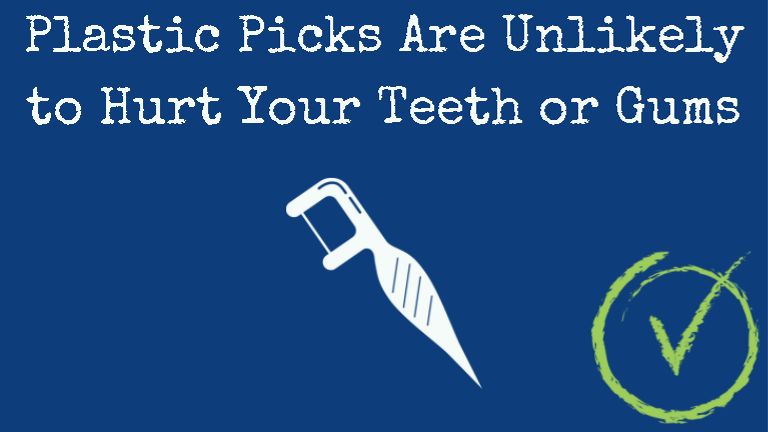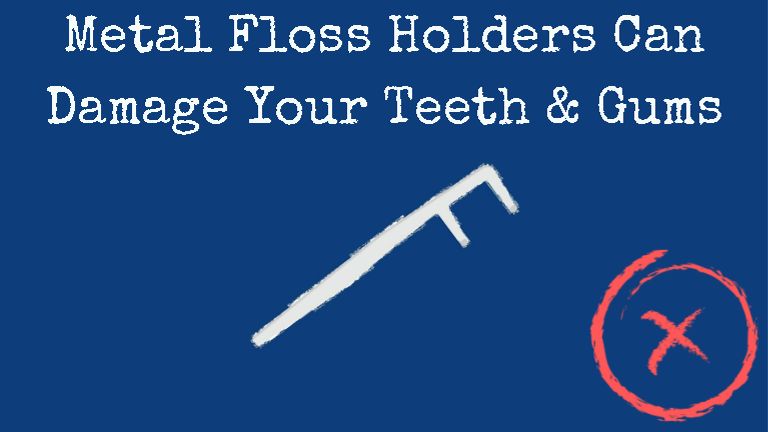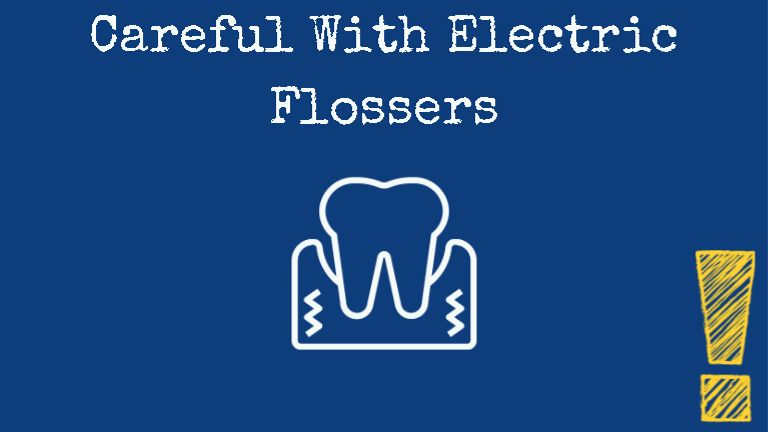Can Dental Picks Damage Your Teeth & Gums?
Reviewed & Answered By a Dentist
We created the Element floss holder.
But before we did that, we naturally wanted to know:
Are dental picks bad for your teeth or gums?
So we looked through reams of published research…
And we asked a practicing dentist to find out.
Let’s see what they had to say.
This evidence-based article is supported by 12 scientific sources. Written by Artem Cheprasov and reviewed by Greg Grillo, DDS. Last updated: Feb. 8, 2022.

Introduction

There are all sorts of floss picks and floss handles.
Among the best reusable floss picks out there…
Some are made out of plastic and others are made out of metal. Some are electric flossers and others are water flossers.
The best disposable floss picks come in a wide variety, too.
But are any of these types of dental picks safe to use?
In terms of being a hygienic way to floss: yes, they are safe to use.
Yet in terms of physically harming your teeth or gums…
Well…for that…
We read through 10 clinical trials to find the answers for you below.
Plastic Floss Picks

More often than not, disposable dental picks or reusable floss holders are made out of plastic.
When they’re designed and used correctly…
Such plastic dental picks are unlikely to physically harm your teeth or gums.
In fact, one clinical trial examined exactly this issue.
In this trial, the researchers asked a group of people to floss using regular floss and disposable floss picks. 1,2
After 60 days of flossing, the scientists collected and analyzed the study’s data.
The researchers discovered the following:
Theoretically, both the regular floss and the floss picks could cut a person’s gums when used incorrectly. In reality, neither the regular floss nor the floss picks caused any significant damage to anyone’s gums.
Of the minor gum trauma that was noted on rare occasion…
There was no statistically significant difference between the two methods of flossing.
In other words:
In this study, scientists found a similar risk of very rare and minor trauma to the gums…
For both methods of flossing.
With neither method being truly riskier than the other.
The researchers noted the obvious:
The risk of any such trauma can be greatly minimized with proper instruction and use.
Can Metal Dental Picks Hurt Your Teeth and Gums?

Yes, metal floss picks can injure your teeth and gums.
Actually, we wrote a well-researched article on this topic (the link to it is directly above)…
The article was reviewed by a dentist and biomedical engineer…
And it goes into the details of exactly why metal dental picks can be so dangerous.
Here’s a quick summary:
Although your enamel is quite strong…
It’s actually pretty brittle.
So:
If a reusable flosser is made out of a metal that’s harder than your enamel…
Your teeth can be scratched, chipped, and cracked.
Never mind the damage these metal flossers can cause to your soft tissues. Like your gums.
Are Electric Flossers Dangerous?

They can be bad for your gums. But they don’t have to be.
In one clinical trial, researchers compared finger flossing with an electric flosser. These are also called power flossers or sonic flossers.
The researchers collected data that helped them determine if electric dental picks can damage a person’s gums.
In this study, none of the participants who flossed with their fingers damaged their teeth or gums. However, two of the people who used the electric flosser hurt the soft tissues of their mouth. 3
A review of this study indicated that this was likely as a result of the improper use of the power flosser…4
As opposed to something being wrong with the sonic flosser itself.
That’s because:
Once the researchers reviewed the proper flossing technique with the two individuals again, no damage occurred thereafter.
In other words, if a sonic flosser is properly designed and used, then the chances of damaging your teeth or gums should be quite low.
Research Bias

We actually pored through data from 10 clinical trials… 1,3,5–12
And the summaries of about 12 other ones… 4,13
To get you the best answer that we could.
However…
You’ll note above that we only talked about a handful of studies in-depth.
That’s because many of the studies didn’t bother to reveal whether or not dental picks caused any damage to the teeth or gums. 4,13
Was it because there was absolutely no damage to report?
Was it because the scientists simply didn’t look for, or didn’t properly assess for, any damage?
Or was it because the scientists chose not to report the damage?
We’ll never know.
Plenty of other papers claimed that any observed damage was not due to the dental pick under study. Again…because there weren’t enough details provided in the papers…it made it hard for us to tell whether this was true or not. 4,13
That means there may be a “selective reporting bias” that makes dental picks seem more or less safe than they actually are.
A Dentist’s Answer
We asked Dr. Greg Grillo to review this article for accuracy and then to chime in with his professional opinion on the topic. Here’s what he had to say:
In 27 years of dentistry, I haven’t seen any significant damage to teeth or gums when patients use plastic or wooden picks. In fact, I’ve observed thousands of patients who’ve successfully used picks to control interproximal plaque. Patients have the best oral health when they establish cleaning habits that they practice consistently. And any gum trauma is usually eliminated with slight technique modifications.
Brushing without interproximal cleaning misses about 35% of the tooth surfaces, and many patients struggle with traditional flossing. As a result, only about 30% of people in the U.S. floss daily. One double-blind study showed that patients removed more plaque [with floss picks] than with traditional rolled floss, so picks present a viable alternative for practical use.5 The research appears consistent with my clinical observations across many patient groups.